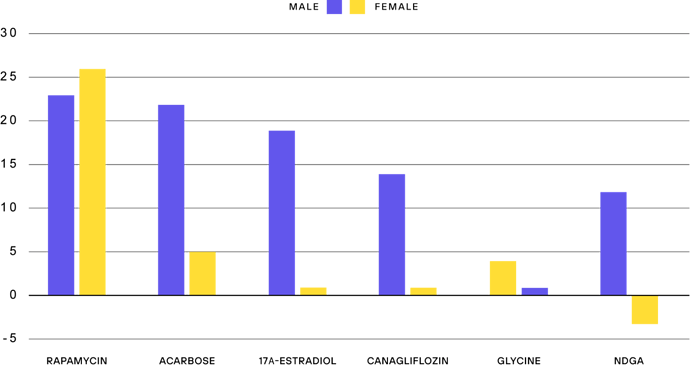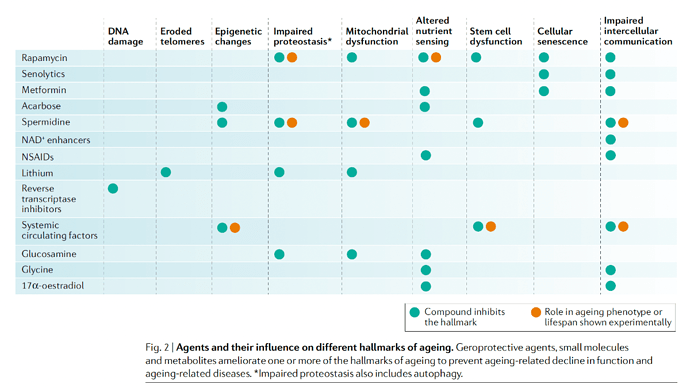
Rapamycin is by far the world’s leading candidate for an effective and accessible anti-aging drug. Nothing else comes close. If you’re interested in a longer, healthier life, you probably want to consider taking rapamycin, talk to a doctor that is familiar with rapamycin, or at least keep a close eye on the research going forward.
Rapamycin is considered by many geroscience researchers to be the “gold standard” of anti-aging drugs for some very good reasons. First of all its been shown to be very effective; the lifespan improvement seen in animal trials are consistently the best of any drug (about 15% to 30% shown in many mouse studies). Additionally, it has successfully increased healthspan and lifespan in a wide variety of different species of organisms and animals, and its efficacy has been validated by many different research groups.
Rapamycin is also FDA approved (albeit at higher doses for cancer and transplant patients), and has been used in millions of patients, over the past 20+ years. Last, but not least, it is very affordable, and even inexpensive from some sources.
Below are more details on these important attributes of rapamycin.
Rapamycin is Safe
Rapamycin is an FDA-approved drug that has been used for over 20 years by millions of (sick) people. Rapamycin is now in ongoing, longterm testing in healthy monkeys and dogs with success already reported on safety and some age-reversal and functional improvement in organs (monkey study1, monkey study 2, dog study).
Its Effective:
The drug rapamycin is currently the most effective and reproducible pharmacological approach for directly targeting the aging process to increase life span and health span in laboratory animals (5).
Its extended lifespans significantly (typically 15% to 30%) in every organism its been tested: including yeast, worms, flies, mice, and is now in ongoing trials in marmoset monkeys and dogs (pets). The mTOR pathway (a nutrient signaling pathway) is conserved across a billion years of evolution. mTOR is now widely recognized as a central regulator of lifespan and aging, and rapamycin is the first drug to effectively control or modulate mTOR.
Rapamycin positively impacts most hallmarks (the key characteristics and measures) of aging, and it has been shown to increase life span in each of the major invertebrate model organisms and in rodents (4). Rapamycin increases lifespan by 10 to 30% in multiple strains of mice when started either early or late in life, and when administered continuously (6, 7), intermittently (8), or transiently (9).
Rapamycin Lifespan Extension in Males & Females vs. Other Longevity Drugs (% Increase)
Graph Above: Rapamycin Lifespan Extension in Male & Female Mice: compared to the other leading lifespan improving drugs, as tested by the NIH National Institutes on Aging Interventions Testing Program (the “gold standard” of lifespan experiments):
Its Results have been Validated, Reproduced:
The results have been duplicated by many different research labs, many times over the past 20 years. In scientific terms, its effectiveness is highly reproducible; it has been proven effective by people testing it at the University of Washington, at Harvard, at the University of Wisconsin, and many more over the past 15 years. Unlike some newer age-focused therapeutics, the efficacy of rapamycin has been validated consistently by many different independent academic groups.
It Works in Early Adulthood and Middle Age
Rapamycin has been tested, and it works (i.e. increases lifespan) when started earlier in life (e.g. mouse equivalent of early adulthoods, age 20 or so) or mid-life (equivalent to 60+ in humans). Many other drugs and therapeutic approaches (e.g. caloric restriction) that seem to provide some longevity benefits do so only when used starting in childhood; something that most people consider impractical and unlikely for human use. Rapamycin is unique in both its effectiveness and usefulness at any age after early adulthood.
Studies:
- Rapamycin fed late in life extends lifespan in genetically heterogeneous mice
- Rapamycin-mediated mouse lifespan extension: Late-life dosage regimes with sex-specific effects
- Rapamycin, but not resveratrol or simvastatin, extends life span of genetically heterogeneous mice
Notably, a single 3-month “high dose” treatment regimen was, in 2016, shown to increase remaining life expectancy of mice by up to 60% over non-treated controls (9). In this study, the total lifespan improvement (14% in males) from the high, 3 month dosing regimen was more than the ITP low dose rapamycin taken from early mouse adulthood through end of life (10% in males), and almost equal to the ITP “moderate dose” regimen from middle age through end of life (20% in males). This suggests that rapamycin may not need to be taken for many decades to still offer significant improvements in health and lifespan. It even seems to positively impact fertility and egg quality in females.
It seems to slow down, prevent, or reverse aging in most organs and tissues:
Not only does rapamycin treatment increase life span but it also delays, or even reverses, nearly every age-related disease or decline in function in which it has been tested in mice, rats, and companion dogs, including cancers, cardiac dysfunction, kidney disease, obesity, cognitive decline, periodontal disease, macular degeneration, muscle loss, stem cell function, spinal disc and immune senescence.
See:
- Short-term rapamycin persistently improves cardiac function after cessation of treatment in aged male and female mice.
- Rapamycin Rejuvenates Oral Health in Aging Mice
- Hearing Loss Prevented (if started early) or Minimized (if started late) with rapamycin
- Even with calorie restriction, rapamycin slows muscle aging
- Rapamycin restores brain vasculature, metabolism, and blood-brain barrier in an inflammaging model
- The mechanistic target of rapamycin: The grand ConducTOR of metabolism and aging.
- Preserving youth: Does rapamycin deliver?
- Video: Effects of rapamycin on age-associated intervertebral disc degeneration
- Short‐term rapamycin treatment increases ovarian lifespan in young and middle‐aged female mice.
- How rapamycin can preserve the developmental potential of eggs.
- Rapamycin keeps the reproductive clock ticking.
- How in rats " Rapamycin prolongs female reproductive lifespan".
Rapamycin seems to prevent many of the problems of aging:
Rapamycin seems to prevent many of the common problems that people associate with getting older: The research suggests it prevents weight gain, prevents hearing loss, prevents spine/disc degeneration and prevents blood stem cell aging, to name just a few that have been measured and identified so far:
- Dose-dependent effects of mTOR inhibition on weight and mitochondrial disease in mice
- Evidence that C/EBP-β LAP Increases Fat Metabolism and Protects Against Diet-Induced Obesity in Response to mTOR Inhibition
- Rapamycin but not acarbose decreases age-related loss of outer hair cells in the Cochlea
- Rapamycin Prevents Blood Stem Cell Aging, New MIT Study
- Video: Effects of rapamycin on age-associated intervertebral disc degeneration
- Rapamycin is a good candidate for prevention of Alzheimers
Rapamycin is currently the best drug for addressing the hallmarks of aging
Rapamycin is the best and most-validated compound identified so far to address six of the nine hallmarks of aging. Rapamycin addresses, at some level, most of the nine hallmarks of aging (that is, the key drivers of what we perceive as “aging”).
Image Source: The quest to slow ageing through drug discovery. Nat Rev Drug Discov. 2020 Aug
For more information on Rapamycin for anti-aging, see the Frequently Asked Questions section.

